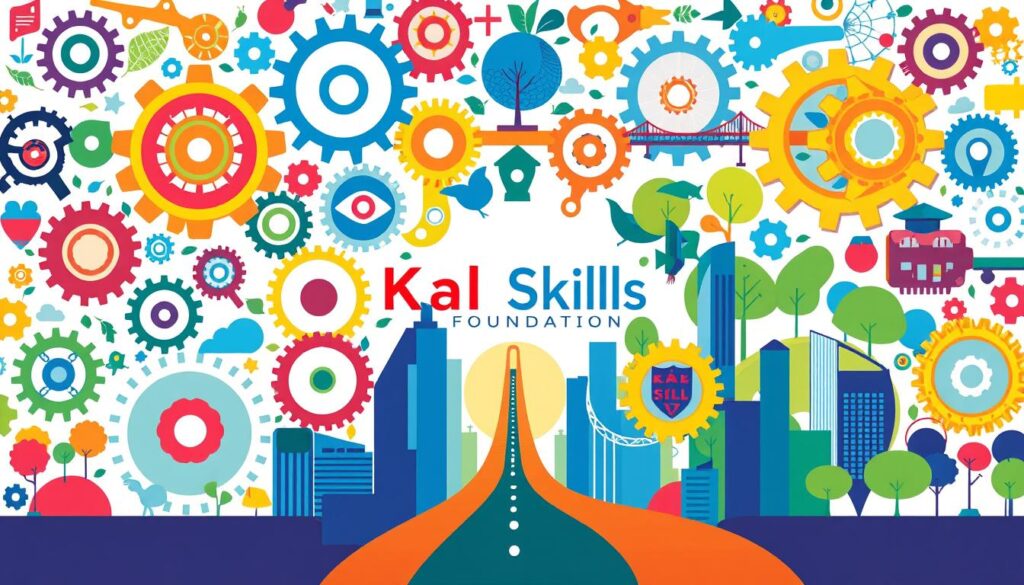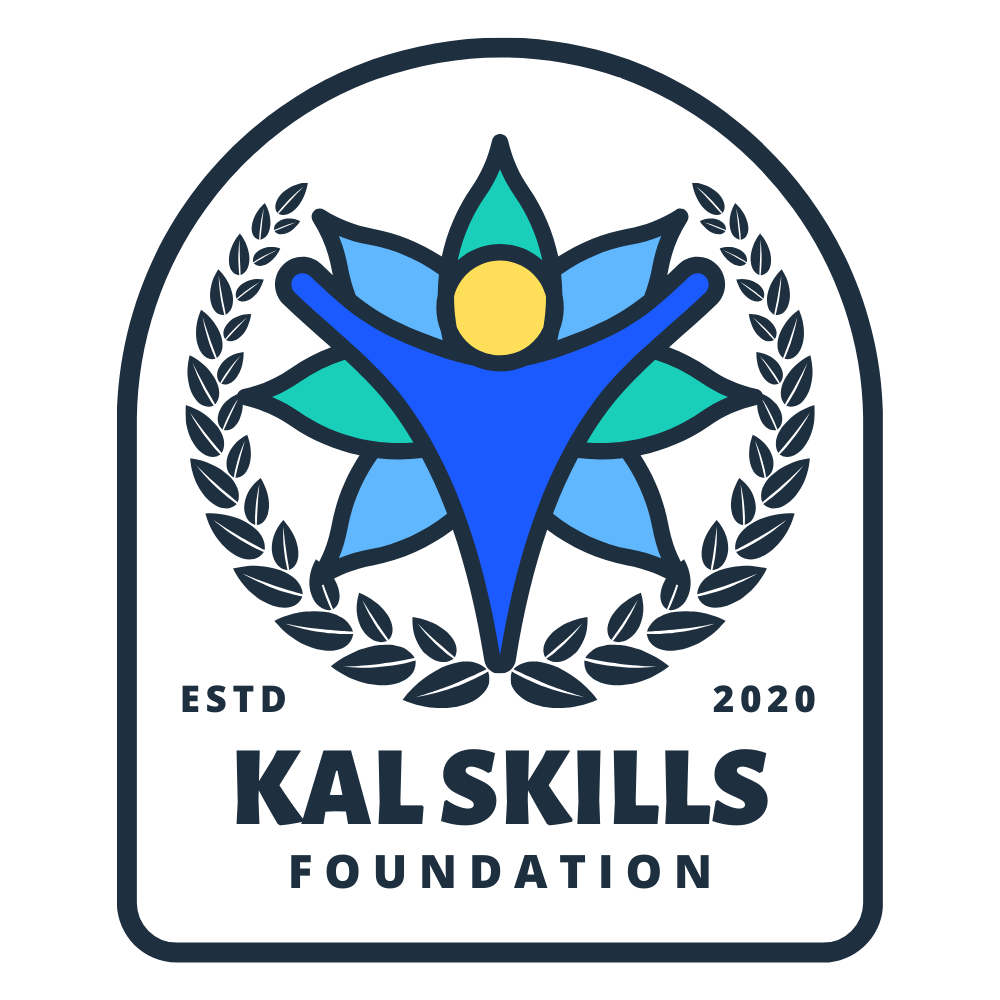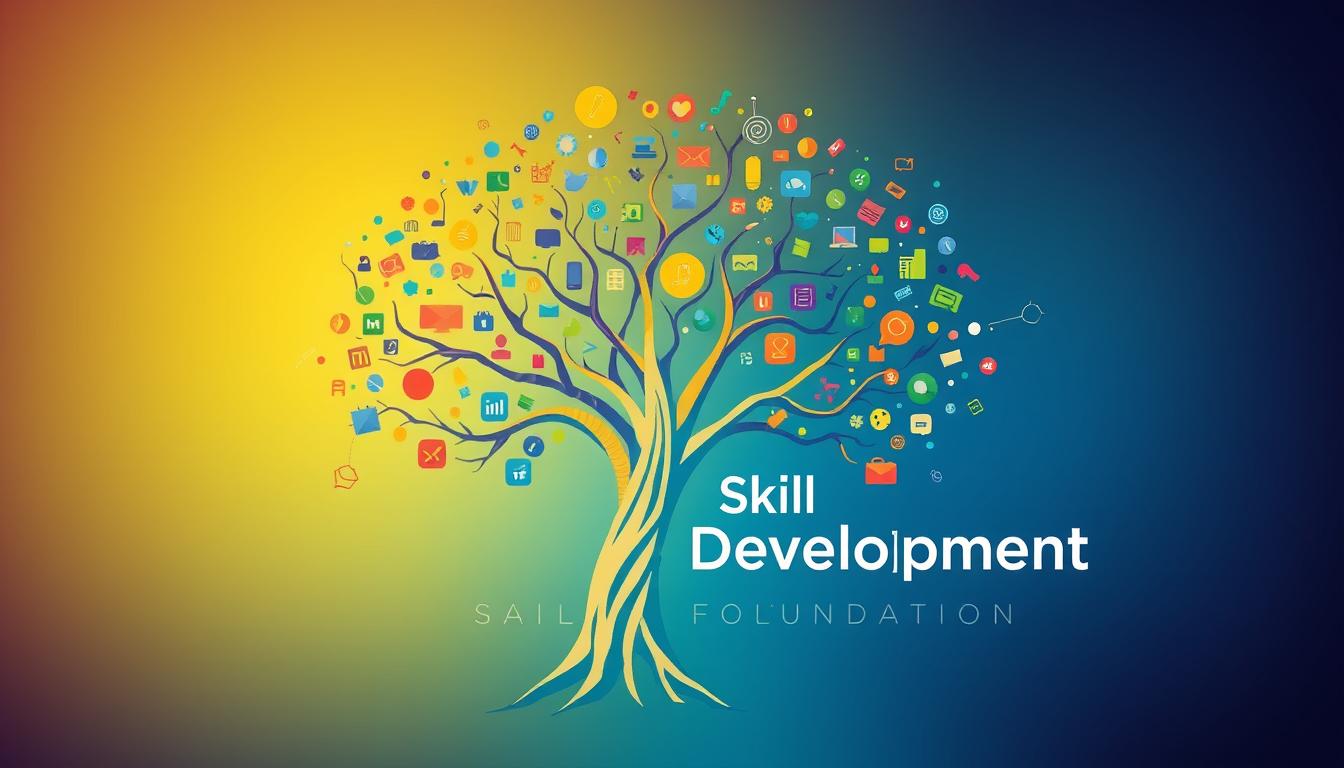In today’s fast-changing job market, a smart skill development plan is crucial. By always learning new skills and staying adaptable, you can set yourself up for long-term success. This approach helps you grow personally and professionally.
Having a solid skill development plan can boost your career. It can lead to new chances, more responsibilities, and higher job satisfaction. This article will show you how to develop skills strategically. It will help you reach your career goals and succeed.
Key Takeaways:
- Continuous learning and skill development are essential for professional growth and career advancement.
- A strategic approach to skill development can lead to new opportunities, increased responsibilities, and greater job satisfaction.
- Adaptability and the ability to acquire relevant skills are key to succeeding in a rapidly evolving job market.
- Pursuing further education and training can significantly improve job prospects, salary, and overall career advancement.
- Developing a well-rounded skill set, including both technical and soft skills, is crucial for long-term career success.
Understanding Skill Development and Career Growth
Skill development is the key to unlocking your full professional potential. It’s not just about enhancing your workplace skillset. It’s about long-term success, more job opportunities, and greater job satisfaction12.
The Difference Between Professional Development and Professional Growth
It’s important to understand the difference between professional development and growth. Professional development is about improving your skills for the short term. Professional growth is about the overall progress of your career1.
To advance in your career, you need the right skills. You also need to keep pursuing professional development opportunities.
The Importance of Skill Development for Long-Term Success
Investing in skill development expands your capabilities and sets you up for long-term success2. It’s important to develop both technical and non-technical skills. Companies often prefer hiring people with superior skills over those with higher qualifications2.
Continuous skill development leads to job security and higher earnings. People who keep learning are more likely to get promotions and reach professional milestones3.
Moreover, a commitment to continuous learning is key for career advancement. It helps you stay competitive in today’s fast-changing global economy3. Lifelong learning keeps you relevant and competitive, positively impacting your professional growth3.
Leveraging Career Development for Career Growth
Career development helps you improve your skills in the short term. Career growth is about your overall professional journey. By focusing on career development, you can find new opportunities and grow in your job4. It’s a way to steer your career and make progress in your work life.
The job market is changing fast because of new technology. This means you need to keep learning and growing in your career4. As you get better at your job, you can earn more money. This leads to a more stable financial future4.
Having the right skills makes you more attractive to employers. They value people who are always learning and improving4.
In tough economic times, having the latest skills and a strong network helps you keep your job4. Building a strong personal brand can also help you stand out. This can lead to new opportunities and career growth4.
Getting advice from mentors and career coaches can really help you grow in your career4. They offer personalized advice and help you set and reach your goals4.
Learning new things keeps you competitive and ready for change4. It’s important to stay relevant in your field. Building a professional network is key to finding new opportunities and getting support4.
The old idea of staying with one company for life is no longer true5. You need to keep learning new skills to stay relevant. There are many ways to learn, like training programs and online courses5.
Leaders need to support learning in the workplace5. They should make learning easy for everyone. Sharing knowledge and rewarding learning can motivate employees to grow professionally5.
For new graduates, setting clear goals and seeking advice is important5. Building a network and staying curious can also help you grow in your career5.
Strategies for Effective Skill Development
To grow professionally and stay ahead in today’s fast-paced job market, you need a solid plan for skill development. Begin by setting clear, specific career goals that match your long-term dreams6. These goals will guide your skill-building, helping you get the skills needed for your dream job.
After setting your career goals, it’s time to embrace a mindset of continuous learning and upskilling67. You can learn through formal education, industry certifications, or on-the-job training. Keeping your skills up-to-date is key to staying ahead and securing your future in your field8. Using AI-driven learning platforms and personalized skilling journeys can boost your skill development and improve your performance.
Investing in your professional growth benefits you and your company67. By focusing on skill development, you become more valuable to your employer. This leads to better productivity, innovation, and keeping employees67. Also, mentoring programs in your company are vital for sharing knowledge, developing skills, and planning for the future6.
In conclusion, a strategic plan for skill development, with clear goals and ongoing learning, is essential for lasting career success and personal growth678.
skill development
Finding the right skills for your career is the first step9. Over 1.1 billion jobs will change in the next decade because of big trends9. Keep up with new skills needed in your field and look for ways to learn them, like online courses or workshops.
Identify Relevant Skills to Acquire
Check your current skills and see what’s in demand in your field9. Around 23 percent of companies say skills are a big problem for them9. Once you know what skills you need, make a plan to get them through learning and training.
Utilize Available Resources and Training
Use what’s available to improve your skills and get ahead10. There are many ways to get better, like certification programs and online courses10. Keep practicing, getting feedback, and learning on your own to get better at new skills.

“The global economy could gain an estimated US$6.5 trillion in the next seven years by closing workers’ skills gaps, representing 5-6 percent of GDP.”9
By finding the right skills and using training, you can grow and succeed in your career91011.,,
Develop Essential Soft Skills
In today’s fast-paced work world, it’s key to build strong soft skills for career growth. Skills like communication, teamwork, being adaptable, and solving problems are vital. They boost your skills and make you more valuable to employers12.
Communication and Collaboration
Good communication is the base of teamwork and working well with others. Improving your communication skills helps you share ideas clearly and listen well. This way, you can connect better with your team13. Teamwork also brings together different skills and views, leading to new ideas and a better work environment13.
Adaptability and Problem-Solving
The ability to adjust to new situations is highly valued in today’s business world13. Employers look for people who can think on their feet, solve problems, and find creative solutions. By improving your adaptability and problem-solving, you help your team stay flexible and strong13.
Working on these soft skills not only makes you better at your job but also makes you more appealing to employers. Keep learning and growing to stay competitive and secure your future in your career.
“The most in-demand skills for the future are soft skills – skills like creative thinking, critical thinking, collaboration and communication.”
– Laura Caroll, CEO of Skillist
Networking and Building Industry Relationships
Networking and building strong relationships in your industry can boost your career. By connecting with professionals, attending events, and staying in touch, you can find new chances, share knowledge, and keep up with trends14.
Using your network can help you grow in your career and offer support. It’s key to have a professional online presence, as employers often check online14. An effective elevator pitch can make a big impression14.
Going to conferences and workshops can help you meet new people and find career chances14. Talking to industry experts through informational interviews is also helpful. Remember to send a thank-you email to keep those connections strong14.
Creating a strong personal brand can improve your career chances and attract new opportunities14. By adding value and staying in touch, you can build lasting connections14.

Networking opens doors to many opportunities, inside and outside your job15. It lets you meet people who share your interests, mentors, and potential partners15. Talking to different professionals can bring new ideas and solve problems in your field15.
Good networking can help your career by showing you job chances, trends, and needed skills15. It also gives you access to important resources like info, funding, and support during tough times15.
To build a strong network, attend events, use social media, join groups, offer value, and keep in touch15. Quality connections are more important than just having many15.
| Networking Benefits | Impact |
|---|---|
| Career Advancement |
|
| Business Success |
|
| Leadership Development |
|
Networking is key for leaders, leading to new ideas, finding talent, and teamwork15. It’s a strategic tool for achieving career and business goals by opening doors and sharing knowledge15.
A study shows 85% of professionals say networking helped their career16. Also, 71% think networking is more effective now than five years ago, with LinkedIn seeing a 30% rise in networking16.
Trade shows and events can increase business partnerships by 40%16. Working with diverse teams can boost business revenue by 25%16. Building lasting partnerships can keep clients for 20% longer, and good listening and communication can lead to 15% more successful collaborations16.
Overcoming shyness can increase networking success by 10%16. 80% of those who faced rejection improved their approach for better networking16.
“Networking is not about just connecting people. It’s about connecting people with people, people with ideas, and people with opportunities.”
– Michele Jennae
Finding a Mentor or Becoming a Mentor
Looking for a mentor or wanting to be one can really help your career. A mentor can share their knowledge, guide you in your field, and give you feedback. Mentorship offers a chance to learn from experts, grow your network, and see things from new angles.17
The Benefits of Mentorship
Mentorship brings many benefits. Mentees are more likely to get promoted, and mentors are more likely to advance in their careers.18 Also, mentees are happier at work and more engaged.18 Companies with mentorship programs also see less employee turnover18.
For new professionals, mentorship helps understand the industry and build a network. Coaching is great for improving specific skills.17 For those in mid-career, mentorship helps with career changes or moving up. Coaching sharpens leadership skills and project management.17 Senior professionals use mentorship to give back or explore new paths. Coaching refines skills like decision-making and leadership.17
A 2023 report from MentorcliQ found that 100% of Top 50 Fortune 500 companies have mentoring programs. These companies see a 110% profit increase each year.18 Clearly, mentorship is good for both people and companies.
“Mentorship is invaluable for early-career professionals to understand industry norms and network, while coaching is ideal for honing specific skills critical to the role.”
Getting a mentor or becoming one can change your career. You can find a mentor by reaching out to respected colleagues, attending events, joining associations, or using Merit.17 To find a coach, look for professional services, ask colleagues, or check with HR.17
Whether you’re looking for a mentor or want to be one, be open-minded and willing to learn. This way, you can open doors to new opportunities and grow faster in your career171918.
Time Management for Professional Growth
Effective time management is key for professional growth. It helps you focus on important tasks and avoid distractions. This boosts your productivity and reduces stress, leading to a better work-life balance20.
Creating a priority list is a great time management strategy20. It helps you sort tasks by urgency and importance. Setting SMART goals also keeps you focused on your professional goals20.
The 20-minute rule can help you stay focused20. It means working on a task without breaks for 20 minutes. Minimizing distractions and setting clear boundaries also improve your time management21.
Using technology to automate tasks is smart21. Tools like project management software and email templates save time. Taking breaks and caring for yourself also helps avoid burnout21.
Mastering time management is essential for professional growth20. By using these strategies, you can boost your productivity and achieve your career goals2021.
“Lack of focus at work is a critical issue, highlighting the importance of focus in time management coaching engagements.”22
Stress management is vital for focus22. Learning to manage stress helps you stay focused and grow professionally22.

Time management is about balance, not just being productive2021. By following these tips, you can grow professionally and personally2021.
Aligning Skill Development with Organizational Goals
To succeed in your career, it’s important to match your skill growth with your company’s goals. Knowing what skills are needed in your field and working with your employer can make you more valuable. This can open up new chances for you to move up23.
Identifying Organizational Skill Priorities
Companies that focus on managing talent do better than others23. Good talent management makes businesses more adaptable and innovative. It also leads to happier, more productive employees23.
When employees’ skills match the company’s goals, the workplace works better. Everyone feels more connected and has a sense of purpose23.
Offering jobs that fit what employees can do helps keep them. Talking and understanding each other’s needs is key to matching skills with goals23. Finding and using hidden talents in teams can boost creativity and work efficiency23.
Working together across departments helps find and grow new skills23. Clear goals motivate and unite teams. When teams help set goals, they feel more committed to achieving them23.
Goals should reflect a company’s values and mission. This adds meaning and depth to work. Being flexible with goals helps adapt to changes in the business world23.
Training is vital for matching skill growth with company goals24. Training that matches goals helps use resources wisely. It also makes employees happier and more committed24.
Training shows employees their growth matters. This can lower turnover rates by making them feel valued24.
Checking for skills gaps is key to knowing where to train24. Individual Development Plans help employees plan their careers. They also help HR plan training24.
Offering flexible training options makes learning easier for everyone24. Career paths help keep talent by showing clear ways to advance24.
“Aligning employee skills with organizational goals is a strategic imperative for businesses seeking to thrive in today’s dynamic market landscape.”
Setting SMART Goals for Skill Development
To grow your skills, you need clear, measurable, and timely goals. Use the SMART framework (Specific, Measurable, Achievable, Relevant, and Time-Bound) to make smart goals. This method helps you plan your career growth in a structured way25.
By making your goals SMART, you ensure your skill-building is focused and measurable. This leads to better career success in the long run.
The SMART Framework Explained
The SMART framework is great for setting skill development goals26. It helps you make goals that are:
- Specific: Your goals should be clear and well-defined, with a specific outcome in mind.
- Measurable: Quantify your goals so you can track your progress and measure your success.
- Achievable: Set goals that are challenging yet realistic, based on your current skills and resources.
- Relevant: Ensure your goals align with your long-term career aspirations and organizational priorities.
- Time-Bound: Establish a specific timeline for achieving your goals, with intermediate milestones.
By using the SMART framework, you can map out your career growth. This approach is both strategic and doable27.

Setting SMART goals is key in today’s fast-changing job market25. Stay flexible, keep learning, and celebrate your wins.
Continuous Learning and Adaptability
In today’s job market, learning and adapting are key for lasting professional growth. Keep a lifelong learning mindset. Stay curious about new tech, trends, and skills needed. Show you can adapt by welcoming change and seeking new challenges28.
This way, you can handle the job market’s ups and downs. It helps you move forward in your career.
Companies that focus on personal and professional growth attract more job seekers28. A culture of continuous learning boosts employee engagement and keeps them around28. It also sparks innovation and makes the company more adaptable28.
Learning together makes a workplace more dynamic and strong28. Leaders who support learning inspire their teams28. It’s important to find and fill skills gaps with learning programs28.
Using tools like DeepHow makes learning easier and more fun28. By learning and adapting, you grow your career and help your company succeed28.
“Continuous learning is the minimum requirement for success in the modern economy.” – Brian Tracy, author and motivational speaker.
Learning and adapting are essential for both your career and personal growth2930. By always learning and being open to change, you open doors to new chances. You stay current in your field and grow professionally.
Celebrating Achievements and Recognizing Progress
Celebrating your achievements and recognizing your progress is key to growing your skills. Acknowledge your milestones, like earning a new certification or mastering a skill31. Celebrating these moments boosts your morale and shows your dedication to growth32. It also inspires others and promotes learning in your workplace.
Make a “sunshine folder” to keep track of your achievements32. This folder motivates you and reminds you of your growth. Share your successes with others too32. This can make you feel more confident and motivated.
Join groups that celebrate progress and achievements31. For example, join a Facebook group with over 37,000 women who share their “Wednesday Wins”31. Being part of such communities can inspire you to keep learning and growing.
Don’t forget to celebrate small wins too.32 Break down big goals into smaller steps to stay focused32. Acknowledging these small achievements can make you feel better, more confident, and prevent burnout.
Adopt a mindset of continuous learning and adaptability for your growth33. Celebrating your achievements keeps you motivated and focused32. Remember, enjoying your journey is just as important as reaching your goals.
“Celebrating your achievements, no matter how small, is a powerful way to boost your motivation and drive your professional growth.” –33
Leveraging Learning Resources and Support Systems
Starting your professional development journey means using all the learning resources and support systems you can find. These can be within your company or in the wider industry. They help you learn new skills, keep up with trends, and meet others in your field34.
Using technology for learning in the flow of work (LIFOW) makes you more relevant and effective34. Tools like AI and machine learning make learning easy, tailored to you, and quick34.
Platforms for teamwork and learning, like video calls and chats, help you work together and apply what you’ve learned34. Games, simulations, and videos also make learning fun and easier34.
| Layer | Description |
|---|---|
| Learning Management Layer | Delivery and Tracking |
| Content Layer | Learning Resources |
| Engagement Layer | Interaction and Collaboration |
| Support Layer | Performance Support and Guidance |
| Delivery Layer | Accessibility and Mobility |
| Innovation Layer | Emerging Technologies |
| Data Management Layer | Storage and Analytics |
To get the most from these learning resources and support systems, make sure they work well together. Your learning systems, platforms, and content should all connect smoothly. This lets you use different technologies and grow your skills34.
By using technology for learning, you open doors to new career opportunities34. Personalized, easy-to-access, and team-based learning helps you succeed in today’s fast-changing work world34.
“Continuous learning and adaptation are essential for long-term professional development and career success.” – John Doe, Career Development Strategist
Overcoming Challenges and Maintaining Motivation
Starting a skill development journey can be tough, with time limits and self-doubt. But, with the right strategies and a strong mindset, you can beat these hurdles. Challenges help us grow by pushing us out of our comfort zones and teaching us new ways to reach our goals35.
They help us unlock our potential, build resilience, and learn new skills. This way, we can adapt and succeed in different situations35.
Creating a plan to tackle challenges is key. It helps you reach your goals and manage your time better35. Taking risks lets you grow, learn from mistakes, and find success in unexpected ways35.
Having a supportive group around you makes facing challenges easier35. Tools like mentors, books, and online courses can also help you grow. They offer advice and guidance for your development35.
Staying motivated is vital for success. People in developing areas face many obstacles, showing the need for self-motivation36. Using online platforms and learning on your own can help you advance professionally36.
Having the drive to keep going is crucial for resilience and adaptability36. It helps you overcome setbacks and chase your dreams despite challenges36.
Having a growth mindset is key to staying motivated and overcoming obstacles37. Seeing your abilities as something you can develop is important. Learning from criticism and persevering are also part of it37.
Setting SMART goals and celebrating small wins can keep you motivated37. This helps you stay focused and grow professionally37.
| Strategies for Overcoming Challenges | Techniques for Maintaining Motivation |
|---|---|
|
|
“Challenges are what make life interesting and overcoming them is what makes life meaningful.” – Joshua J. Marine
By tackling challenges and staying motivated, you can grow and become a better professional35. A growth mindset, clear goals, and using resources and support systems are essential for success37.
Conclusion
Investing in skill development opens doors to new opportunities for personal growth, professional excellence, and career advancement38. By learning new skills, making industry connections, and always learning, you set yourself up for success39. This approach not only boosts your career but also enriches your personal life40.
Start your journey of growth with skill development38. Remember, it’s a journey that needs commitment, flexibility, and courage to try new things40. Focus on skills like communication, emotional smarts, time management, and problem-solving to drive your progress40.
Skill development is a key to unlocking your potential and improving your career38. Use the resources around you to grow personally and professionally39. Aim for personal growth, professional excellence, and career advancement39.
FAQ
What is the difference between professional development and professional growth?
Why is skill development crucial for long-term career success?
How can career development strategies help advance your professional journey?
What are the key steps for effective skill development?
How can you identify the most relevant skills to acquire for your career goals?
What are the benefits of developing strong soft skills?
How can networking and building industry relationships support your career growth?
What are the advantages of having a mentor or becoming a mentor?
How can effective time management support your professional development efforts?
Why is it important to align your skill development with organizational goals?
How can the SMART framework help you set effective skill development goals?
Why is continuous learning and adaptability crucial for long-term professional growth?
How can celebrating your achievements and recognizing progress support your skill development journey?
What resources and support systems can you leverage to enhance your skill development efforts?
How can you overcome challenges and maintain motivation during your skill development journey?
Source Links
- 11 Ways to Develop Skills and Knowledge for Work – https://www.mbopartners.com/blog/how-manage-small-business/how-to-keep-your-skills-and-knowledge-current-and-why-it-matters1/
- The Role of Skill Development In Advancing Your Career – https://www.linkedin.com/pulse/role-skill-development-advancing-your-career-futurelift-in-hguuc
- Understanding the Importance of Skill Development for the Future – https://www.linkedin.com/pulse/understanding-importance-skill-development-future-chris-chiancone-2mdac
- Strategies to Achieve Career Development and advancement. – https://www.linkedin.com/pulse/strategies-achieve-career-development-advancement-8ionf
- Analyzing The Role Of Continuous Learning Opportunities: Leveraging Internships For Graduates’ Career Growth – https://elearningindustry.com/analyzing-role-of-continuous-learning-opportunities-leveraging-internships-graduates-career-growth
- Designing a Successful Skill Strategy for the Future Workplace – https://www.mentoringcomplete.com/a-guide-to-developing-a-successful-skill-strategy/
- A Guide To Developing A Successful Skill Strategy | Together Mentoring Software – https://www.togetherplatform.com/blog/a-guide-to-developing-a-successful-skill-strategy
- 5 Learning Strategies to Accelerate Employee Development – https://disprz.ai/blog/learning-strategies-for-employee-development
- Skills Development – https://www.worldbank.org/en/topic/skillsdevelopment
- The Importance of Skill Development and Where to Start – https://www.coursera.org/enterprise/articles/importance-of-skill-development
- What is a skill? Types of skills and how to develop them – https://www.phoenix.edu/professional-development/blog/what-is-a-skill-types-of-skills-and-how-to-develop-them/
- Developing soft skills in the workplace: The whys and the hows – https://www.talentlms.com/blog/developing-soft-skills-workplace-why-how/
- 11 Essential Soft Skills In 2024 (With Examples) – https://www.forbes.com/advisor/business/soft-skills-examples/
- The Importance of Networking and Relationship Building – https://online.marquette.edu/business/blog/networking-and-relationship-building-for-career-success
- The Power of Networking: Building Professional Relationships for Success – https://www.linkedin.com/pulse/power-networking-building-professional-relationships
- Networking: Building Meaningful Connections in Your Industry – Floify – https://floify.com/blog/networking-building-meaningful-connections-in-your-industry
- Mentoring Versus Coaching: Knowing which to seek according to your career phase – https://blog.get-merit.com/mentoring-versus-coaching-knowing-which-to-seek-according-to-your-career-phase/
- How to Find a Mentor: Your Guide to Success – https://www.agile42.com/en/blog/find-mentor
- Mentor Training: Equip Mentors with the Skills They Need | Chronus – https://chronus.com/blog/mentor-training
- Top 16 Time Management Skills to Help You Become a Success – https://www.simplilearn.com/time-management-skills-article
- 7 Essential Time Management Skills – https://www.coursera.org/articles/time-management-skills
- What are Time Management Skills – L&D Glossary – Growthspace – https://www.growthspace.com/glossary/time-management-skills
- Aligning Employee Skills with Organizational Goals — Activate Human Capital Group – https://www.activatehcg.com/blog/effective-talent-management-aligning-employee-skills-with-organizational-goals
- Aligning Training Initiatives with Organisational Goals and Employee Career Development – https://www.employeeconnect.com/aligning-training-initiatives-with-organisational-goals-and-employee-career-development/
- Setting Smart Goals for Professional Development – https://learning.linkedin.com/resources/career-development/smart-goals-professional-development
- What Are Professional Development Goals? 10 Examples + How to Set Them – https://www.coursera.org/articles/professional-development-goals
- How to Set SMART Goals for Professional Development – https://www.skillsoft.com/blog/professional-development-smart-goals
- Embracing Continuous Learning Leads to an Adaptable Workforce – https://www.deephow.com/blog/continuous-learning-leads-to-an-adaptable-workforce
- 8 reasons why continuous learning is crucial for career growth – https://www.cornerstoneondemand.com/resources/article/8-reasons-why-continuous-learning-is-crucial-for-career-growth/
- The Power of Continuous Learning: Strategies for Professional Development in the Workplace – https://trainingmag.com/the-power-of-continuous-learning-strategies-for-professional-development-in-the-workplace/
- Growth Mindset | A Guide to Celebrating Achievements – GeekPack® – Community & Confidence – https://geekpack.com/growth-mindset-a-guide-to-celebrating-achievements/
- Why Celebrating Small Wins Matters – Harvard Summer School – https://summer.harvard.edu/blog/why-celebrating-small-wins-matters/
- Recognizing Achievements: A Formula for Motivation and Success – https://www.linkedin.com/pulse/recognizing-achievements-formula-motivation-success-jacqui-d-eon-amjcc
- Leveraging Learning Technology to Amplify Learning in the Flow of Work – https://trainingindustry.com/articles/learning-technologies/leveraging-learning-technology-to-amplify-learning-in-the-flow-of-work-spon-ei/
- How to Transform New Challenges into Personal Growth Opportunities – https://neelraman.medium.com/how-to-transform-new-challenges-into-personal-growth-opportunities-b991874bd68c
- Overcoming challenges and achieving success through self-motivation – https://mohd-aminu.medium.com/overcoming-challenges-and-achieving-success-through-self-motivation-e656726e4fa1
- Overcoming Obstacles: Strategies for Achieving Your Ambitions – River – https://www.riversoftware.com/career-development/overcoming-obstacles-strategies-for-achieving-your-ambitions/
- Developing Effective Managers and Potential Leaders (Conclusion) – https://americandrycleaner.com/node/127618
- The Importance Of Work Skills Training: Building A Workforce | Sertifier – https://sertifier.com/blog/the-importance-of-work-skills-training-building-a-workforce/
- Why Self Development Skills Are Vital – 15 Must-Have Skills This Year | ProfileTree – https://profiletree.com/self-development-skills/





